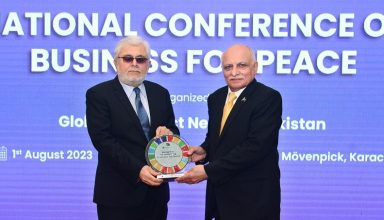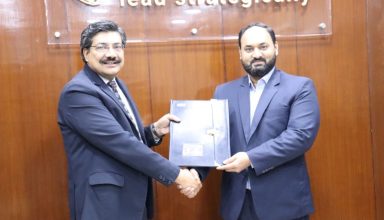Peace not possible without flourishing business: Zubair Motiwala

KARACHI: “Pakistan can progress, sustain, and achieve a peaceful environment if business is provided an enabling environment to flourish and grow. This is highly important in conflict regions of Pakistan where business and society have been tremendously affected due to the nefarious activities of insurgents and extremists. Business activities are the catalyst to ensure a Peaceful, Progressive, Productive, and Prosperous Pakistan”. These views were expressed by Chief Guest Zubair Motiwala, CEO Trade Development Authority of Pakistan, while addressing the Global Compact Network Pakistan Conference on Business for Peace.
Zubair Motiwala, who is also Chairman of the Businessmen Group of KCCI, added that the government is now cognizant of the need to provide a secure and safe business ecosystem for foreign investors. The formation of the Special Investment Facilitation Council would be the channel to motivate the drive for foreign investment and can rightly be termed as a pragmatic vision for Pakistan’s progress and prosperity. He also said that we have enough textile capacity and hence it is time to focus on investments in other sectors.
He highlighted the crucial need to support and facilitate investment in agriculture, mining, and information technology. He advocated the concept of corporate farming as this would introduce modernization through high technology, better seeds, judicious use of water, pesticides, and fertilizer, increased productivity of farms, gradually eliminate the middlemen, and create an export market for the local produce. At the same time, he urged the government to provide facilities to over 200,000 IT freelancers who can play a prominent role in enhancing IT exports from Pakistan. This would also lead to a large reduction in the brain drain from the country.
Lal Dino Mari Baloch, Chairman Silicon Valley Holding Company based in Hong Kong, who was the Guest of Honor, declared that not all experiments to attract foreign direct investment have been as successful as envisioned. There is a dire need to implement policies and to adhere to the commitments made to foreign investors. There is a need to restructure the old system of obtaining a number of NOCs required by foreign investors and advise the government to learn the best practices prevalent in other countries that have attracted large foreign investment.
He highly appreciated the CPEC initiative and advised all Pakistanis to unite in supporting CPEC. He lamented that insurgency in conflict areas naturally leads to low development of the region and that is why areas remain backward and a large population demoralized. Therefore, he offered a proposal that business community, economists, financial and legal experts, etc. must set up Joint Economic Forums or Think Tanks to find real time solutions that would lead to large investments even in conflict areas.
He further said that his company is determined to invest in Balochistan and AJK and has acquired 25,000 and 5,000 acres respectively. He said that the project envisages information technology parks, private sector marinas for foreign yachts, readily available physical and social infrastructure, high security, and even an airplane landing facility.
He was very encouraged by the response he received from all quarters and said that despite being a citizen of Hong Kong and having multiple businesses in many countries, he is determined to bring investment in Pakistan since he is proud of his Pakistani origins. He praised GCNP for organizing the Business for Peace Conference and offered his full support in the future.
Earlier, Majyd Aziz, President GCNP, in his welcome address, stated that the Business for Peace is an initiative of UN Global Compact and is a global platform that recognizes and promotes the transformative role of businesses in fostering peace, stability, and sustainable development in conflict affected and high risk regions. This initiative brings together companies, governments, civil society organizations, and academia to drive positive change and create lasting impact in these regions and beyond.
He added that this also recognizes the value of local ownership and knowledge that are vital to driving change in the region in all aspects. He emphasized that political instability and conflict in Pakistan blights economic and social development, discourages investment, increases corruption, and weakens rule of law. The private sector can be a powerful agent of positive change provided they carry on activities with responsibility and sensitivity.
Majyd Aziz further said that an all-inclusive dialogue must take place between companies and local residents in conflict regions to address, collaborate, and resolve dilemmas and issues, whether economic, environmental, or social. Trust is imperative and the Business for Peace platform is designed to expand and deepen not only the actions of the business community and investors, but also bridge the gap between them and the residents of the region. The vision is to strive for a strong economy, secure and stable societies and the nation, and foster tolerance and create trust.
Junaid Makda, representing Karachi Chamber of Commerce and Pakistan Afghan Joint Chamber of Commerce & Industry as their Former President, stated that it is only Business that can lead to Peace instead of “Piece”. Formalization of business in conflict areas can help reduce tension within the areas as well as at borders and would be a deterrent against smuggling. Border fencing is vital to discourage terrorists and insurgents to enter the country.
He said the fact that border trade between Pakistan and Afghanistan would also transform the conflict areas into a facilitative region for business and employment. The potential is huge and therefore, to attract more people to invest in business, it is important for various government organizations to revisit and revise the laws and their rules. He added that businesses could actively engage in promoting peace through social responsibility, economic empowerment, ethical business practices, environmental sustainability, and creating partnerships and collaboration.
Qazi Zahid Hussain, President PAJCCI and a leading name in the field of transit trade, stated that it is high time both Afghanistan and Pakistan governments create a joint system of trade facilitation and should synchronize their bilateral transit trade policies. He predicted that increased Pak-Afghan trade would open up a wide avenue of trade with Central Asian States. He added that there is an imperative need to reduce corruption in the supply trail in Pakistan and appreciated the fact that corruption in Afghanistan has been mostly eliminated.
Col (R) Maqbool Afridi, a businessman and authority on Gwadar, explained the Gwadar ecosystem through an excellent multimedia presentation. He emphasized that a developed Gwadar would definitely lead to a developed Pakistan. He projected CPEC as a harbinger of prosperity and said that there is no limit to the imagination of the results of CPEC in future. He added that at present there is resentment within the residents of Gwadar because the Gwadar Port is not fully operational, and therefore the Chinese and Pakistani governments must develop an urgent strategic framework to increase activities at Gwadar Port and ensure maximum employment opportunities to the local population, especially the youth. This would steer away the presently disappointed youth from tilting towards insurgent groups. He said the three Ds are essential. Deterrence, Dialogue and Development in that order. This should be the priority of all stakeholders and decision makers.
Dr. Farhan Essa and Dr. Masood Bhalli, representing Rotary Club Polio Campaign, informed the audience about the challenges of providing drops to children in conflict and high risk regions. They informed that Rotary Club International has provided $400 million to Pakistan and 200,000 vaccines-carriers for polio workers. They said that health is wealth and businesses must join the campaign as a corporate social responsibility.
[email protected] source: biztoday

